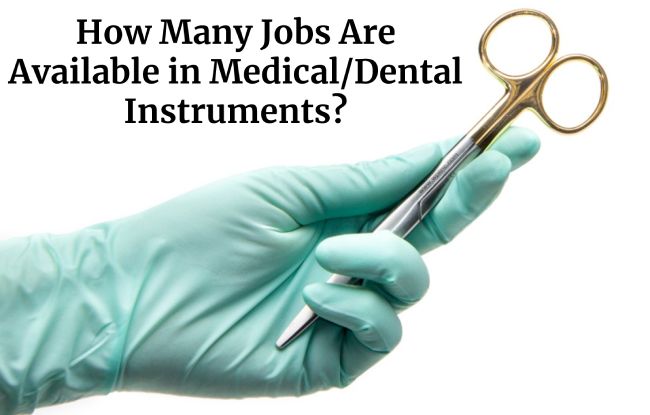The medical and dental instrument industry is growing rapidly, providing a variety of job opportunities for those seeking to enter the field. With such a wide range of jobs available in the medical dental instrument sector, it can be difficult to know exactly how many positions are open at any given time.
The U.S. Bureau of Labor Statistics (BLS) reported that there were over 2,500 people employed as Medical Equipment Preparers in 2018 alone and employment was expected to continue increasing through 2028.
Additionally, BLS also reported that there were over 125,000 people employed as Dental Assistants in 2018 with expected growth in this profession continuing into 2028 as well.
Other occupations within the medical dental instruments field include Dental Hygienists and Dental Laboratory Technicians which make up approximately 150,000 and 50,000 individuals respectively according to BLS data from 2018.

Best-Paying Jobs in the Dental/Medical Instruments Industry
1. Dental Assistant: Average Salary: $37,000
For those interested in entering the dental medical instruments industry, a career as a dental assistant may be the best-paying option. A 2018 study by the Bureau of Labor Statistics (BLS) found that dental assistants make an average salary of $37,000 annually. This makes them one of the highest-paying jobs in the healthcare field and provides greater pay than most other positions within this industry.
Dental assistants have multiple responsibilities; from setting up materials for procedures and helping dentists during these treatments to performing administrative tasks such as scheduling appointments. They also provide patient education about oral hygiene and preventive care strategies to help patients more easily maintain their oral health between visits.
These varied roles require excellent communication skills and a strong knowledge of dentistry practices; many states require certification or licensure before individuals can become full-time dental assistants.
2. Audiologist: Average Salary: $90,000
Audiologist: $90,000 – Best-Paying Job in the Dental Medical Instruments Industry is an article that explores the growing demand for audiologists to provide audiology services. Audiologist salaries are highly competitive and have grown steadily over the years. In fact, this profession has become one of the highest-paying jobs available in the dental medical instruments industry.
Audiologists work to diagnose, prevent and treat hearing and balance disorders by providing comprehensive audiological evaluations, counseling on hearing loss prevention strategies, and fitting of hearing aids or other assistive devices. They may also specialize in specific areas such as pediatric audiology or cochlear implants. With increasing awareness about hearing health issues among patients, there has been a rise in demand for audiologists from both the public and private sectors.
3. Dental Hygienist: Average Salary: $ 77,090
The Dental Medical Instruments industry has a highly sought-after job that is the best-paying in its field. The profession of a dental hygienist is one of the most lucrative and rewarding careers in the entire medical sector.
With an average salary of $77,090 and a median income of $70,210 according to the U.S. Bureau of Labor Statistics, it is no wonder why this position has become so popular among dentists and healthcare professionals alike.
A dental hygienist provides preventive care for patients by cleaning teeth, educating them about proper oral hygiene, performing routine checkups, and applying fluorides or other treatments to prevent cavities or gum disease. In addition to providing basic dental care services, they also advise patients on how to effectively maintain their oral health through diet and lifestyle changes.
4. Cardiovascular Technician: Average Salary: $60,000
Cardiovascular technicians enjoy an average salary of $60,000 – making it the best-paying job in the dental medical instruments industry. Those who work as cardiovascular technicians have a passion for helping others and providing excellent patient care.
As this sector represents one of the fastest-growing areas within healthcare, those with experience and knowledge are highly sought after.
As a cardiovascular technician, you will be responsible for setting up and operating special medical equipment used to diagnose patients with heart conditions. You may also be asked to monitor vital signs, perform routine diagnostic tests, or conduct stress tests while working in collaboration with physicians and other medical professionals.
In addition to being able to provide quality patient care, successful candidates must possess excellent communication skills as well as strong problem-solving abilities in order to effectively analyze data obtained through testing.
5. Biomedical Equipment Technician: Average Salary: $57,000
The dental medical instrument industry is an ever-growing and expanding field, offering a variety of job opportunities. One of the best-paying jobs in this sector is that of a biomedical equipment technician, with an average salary of $57,000.
This specialized role requires extensive knowledge and expertise in operating sophisticated pieces of medical equipment used for diagnosing, monitoring, and treating various illnesses and diseases.
Biomedical equipment technicians are responsible for inspecting, installing, maintaining, repairing, and calibrating medical instruments such as x-ray machines; ultrasounds; ventilators; lasers; endoscopes; CAT scanners; dialysis machines; pacemakers, and defibrillators. They also need to be highly knowledgeable about computers as they must use specialized software to program these types of devices.
6. Surgical Technician: Average Salary: $56,000
Surgical technicians are a vital part of the dental medical instruments industry. With an average salary of $56,000 per year, they are one of the best-paying jobs in this field.
Surgical technicians play an important role in performing operations and assisting surgeons in the operating room. They also have the responsibility of preparing patients for surgery and making sure all necessary tools and equipment are available.
When it comes to their duties, surgical technicians must be knowledgeable about anatomy, pathology, pharmacology, and other healthcare-related topics. They must be able to anticipate a surgeon’s needs during a procedure, as well as ensure that supplies are adequately stocked for emergencies or unexpected circumstances.
Additionally, surgical technicians monitor vital signs during surgeries and prepare sterile solutions under the direction of a surgeon or nurse practitioner. This position requires excellent communication skills because they work directly with patients and medical staff members alike.
7. X-Ray Technician: Average Salary: $55,000
X-Ray technician is one of the best-paying jobs available in the dental medical instruments industry. According to the United States Bureau of Labor Statistics, an X-Ray technician earns an average annual salary of $55,000. This makes it one of the highest-paying positions within this field and a great opportunity for anyone looking to pursue a successful career in medical instrumentation.
X-Ray technicians are responsible for operating x-ray machines and analyzing images taken by radiologists and other imaging specialists. They work in hospitals, clinics, and private practices all over the country providing accurate information on anatomical structures and helping to diagnose diseases. As well as having access to state-of-the-art tools and equipment, X-Ray technicians also receive excellent benefits including paid holidays, health insurance coverage, retirement plans, and flexible working hours.
8. Dental Implant Coordinator: Average Salary: $50,500
Dental implant coordinators are some of the best-paying jobs in the dental medical instruments industry, with an average salary of $50,500 per year. These professionals are responsible for coordinating and managing all aspects of care related to dental implants. This includes everything from pre-operative care and patient education to post-operative follow-up visits and appointments.
The job requires knowledge of both oral healthcare and medical technology, as well as excellent communication skills. Dental implant coordinators must be detail-oriented and able to multitask effectively while staying organized under pressure. They must also have a good understanding of dental insurance plans, procedures, reimbursement policies, and regulations. In addition to the technical knowledge required for this position, dental implant coordinators must also possess strong interpersonal skills so they can successfully interact with patients throughout their entire treatment process.
9. Periodontist: Average Salary: $85,000
A periodontist is one of the best-paying jobs in the dental medical instruments industry, with an average salary of $85,000. Periodontists are oral surgeons who specialize in diagnosing and treating diseases that affect the gums and supporting structures of teeth. They often perform surgeries such as bone grafts, gum grafts, and tissue regeneration to help treat periodontal disease.
In addition to providing treatment for periodontal diseases, a periodontist also provides preventive care such as scaling and root planning to help reduce further damage due to gum disease. They may also apply surgical techniques to correct defects in the jawbone caused by tooth loss or trauma. Periodontists can also provide cosmetic procedures such as dental implants or even orthodontic treatments like braces and Invisalign.
10. Orthodontist: Average Salary: $284,000
Orthodontists are highly sought-after professionals who specialize in the prevention, diagnosis, and treatment of dental irregularities. Earning a median salary of $284,000 per year, they are the best-paid members in the growing dental medical instruments industry. With their expertise and skillset in high demand from patients looking to correct misalignments such as bite problems or overcrowded teeth, orthodontists stand at the forefront of oral health care.
The job role encompasses a range of responsibilities including assessing patients’ conditions, establishing treatment plans, and providing advice on how to improve oral hygiene. Orthodontists also use advanced tools and technologies like X-rays or 3D imaging for evaluating tooth movements before recommending braces or other corrective treatments. As with any profession in healthcare, staying up-to-date with new techniques is essential for success within this field.
